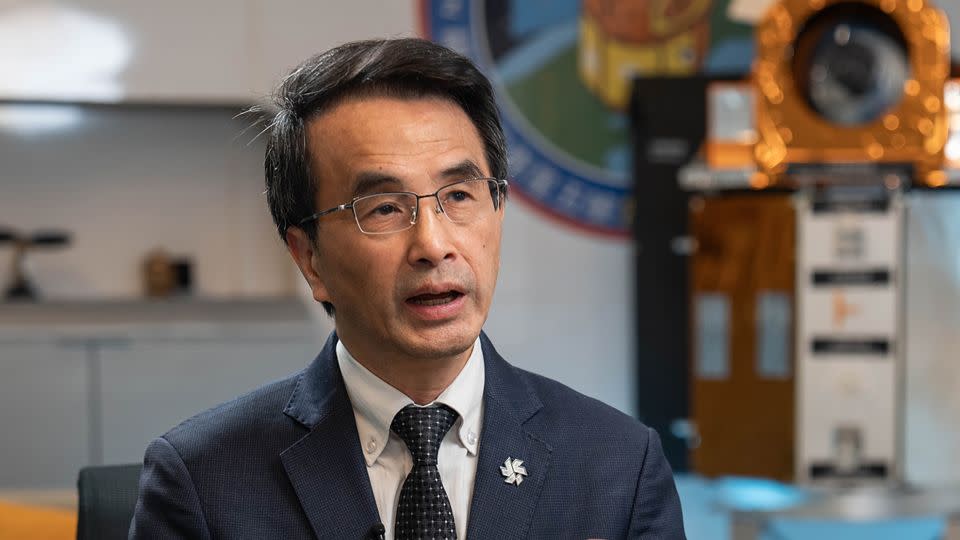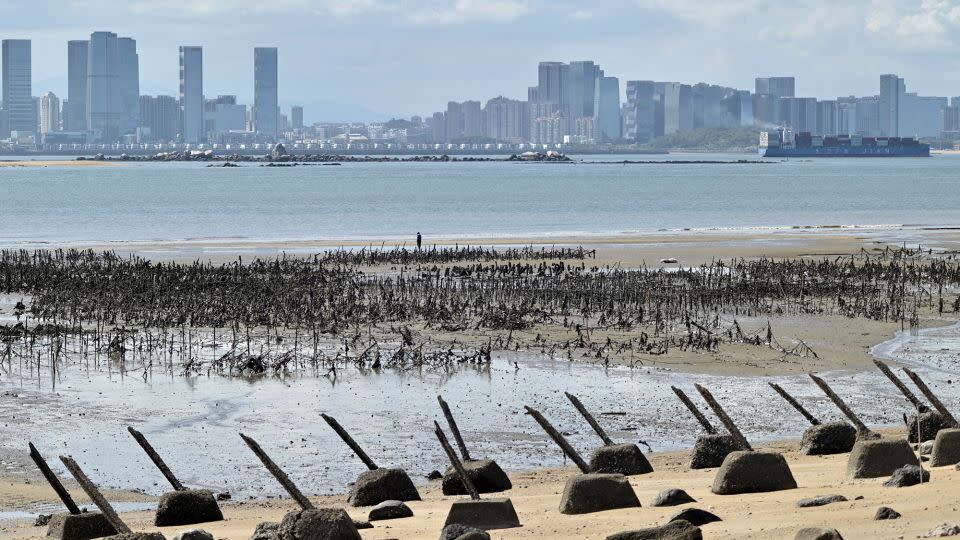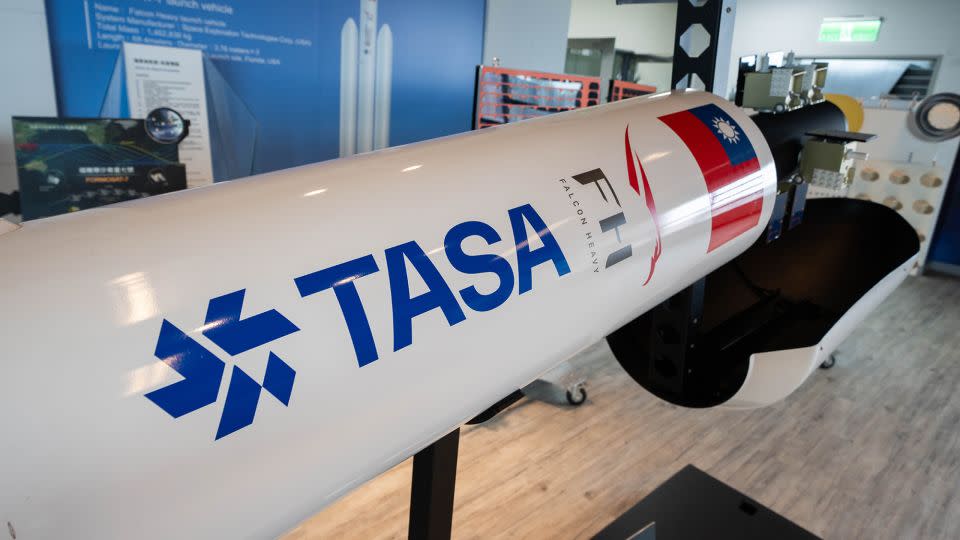from Taiwan Leaders are working on an ambitious new satellite system to keep the island online in the event of a disaster as it deals with the constant threat of hostilities with China.
Wu Jong-shinn, director-general of the Taiwan Space Agency (TASA), told CNN in an exclusive interview that Taiwan is in an “experimental development phase” in efforts to build new local communications satellites.
Once the system is up and running, it could work in a similar way to Elon Musk’s Starlink satellite system in providing internet access — albeit on a much smaller scale, said Wu, who has led Taiwan’s space programs since 2021.
Starlink, operated by Musk’s SpaceX, uses a network of thousands of satellites to provide Internet to users around the world, including areas where conventional connections are not available.
It has been used by the Ukrainian military on battlefronts in defense against Russian invasion. In Gaza, devastated by Israel’s war against Hamas, it allowed staff at a field hospital to conduct medical consultations via video in real time.
But Taiwan does not have access to Starlink because SpaceX insisted on majority ownership of a proposed joint venture, a demand inconsistent with Taiwan’s local laws. This was part of the reason why Taiwan developed its own technology.
“The communication satellite is very important to our communication resilience during urgent times,” Wu said, calling it his agency’s most sensitive project. “This is very important to us, so we take this very, very seriously.”
A vulnerable network
Taiwan’s unique geopolitical landscape and location, approximately 160 kilometers off the coast of China, add urgency to an ambitious project. China’s ruling Communist Party claims the island as part of its territory and has repeatedly promised to take it by force if necessary.
Currently, Taiwan’s connectivity is served by 15 submarine internet cables that connect it to the rest of the world. But these cables are susceptible to damage. Last year, a group of islands outlying Taiwan was no internet for weeks after two submarine cables connecting them to the main island of Taiwan were damaged by passing ships.
High-speed Internet is crucial for the normal functioning of any society, but in the case of Taiwan, a deliberate attempt to sabotage the system could have other repercussions. In a report published by the National Defense and Security Research Institute, a research body affiliated with the Taiwanese government, experts warned that if Beijing were to cut Internet cables around Taiwan, it could disrupt regular communications and cause widespread panic.
Taiwanese authorities previously announced that the space agency would develop two communications satellites, the first of which could be launched by 2026. It would later also help private companies with the launch of four additional satellites to help them make inroads into industry. However, Taiwan would need to send up hundreds of satellites if it wanted to create a system that would provide uninterrupted backup access to the Internet, experts told CNN.

Brad Tucker, an astrophysicist at the Australian National University, estimated that Taiwan would need at least 50 satellites to provide “pretty decent” emergency coverage with its own satellite constellation – and the more the merrier.
“To really have reliable bandwidth so that everyone can serve it, you’re going to need a lot more [satellites]you’re probably talking in the hundreds,” he said.
“If a country dedicates itself to this, it can definitely complete it,” he added. “Because the hard part is getting the financing to launch them all.”
Su Tzu-yun, director of Taiwan’s Institute of National Defense and Security Research, said that although it was “unrealistic” to think that Taiwan would be able to provide complete Internet coverage with just a few indigenous satellites, the space project is valuable in the long term. .
“Taiwan’s development in this area is very significant because it allows us to enter the space industry and provides greater flexibility for our military to access communications systems in our future weapons development,” he said.
And before Taiwan reaches that capacity, the island could still provide backup connectivity in the near future through partnership with OneWeb, a London-based satellite communications system, and other maritime satellite systems, he added.

Strengthening resilience
Ensuring that Taiwan’s communications systems remain functional in extraordinary times has been a growing priority for the island’s top leaders in recent years. In addition to tasking the space agency with the satellite project, Taiwan’s government created a ministry of digital affairs in 2022 to increase communications resilience. This ministry was partnership with foreign satellite service providers and installation of new terminal equipment in remote locations in Taiwan to provide connectivity.
By the end of 2024, 700 hotspots will be established across the island to enable satellite communications during emergency situations, authorities announced in March. The initiative has proven useful during a period of magnitude Earthquake 7.4 which hit eastern Taiwan in early April.
Although traditional communications systems were disrupted near the epicenter, authorities successfully utilized OneWeb to provide emergency Internet access to first responders and stranded personnel.
In the future, Taiwan’s satellite system could replace agreements with third parties, but Wu, the space agency’s director, declined to provide more specific details about the project’s timeline. According to people familiar with the matter, the new administration is expected to release an updated plan and timeline for its space programs, including its communications satellite project, after Taiwan’s President-elect Lai Ching-te takes office on 20 of May.

Big ambitions in space
Taiwan’s space ambitions go beyond the development of local communications satellites.
Wu said a main goal has been to create a new industry in Taiwan that can capture growing opportunities in space projects internationally. Last year, President Tsai Ing-wen announced an investment of NT$25.1 billion (US$790 million) in the island’s space programs over the next decade, with the aim of helping companies from various sectors – including chip design and precision machinery – enter the space industry.
Despite its relatively small size, Wu believes Taiwan is a desirable location to develop space projects because of its undisputed role as a leader in advanced semiconductor chips – which are needed to power everything from computers to artificial intelligence.
One Taiwanese company in particular, Taiwan Semiconductor Manufacturing Company (TSMC), produces around 90% of the world’s super-advanced semiconductors and supplies global technology giants like Apple and Nvidia.
In addition to semiconductors, Wu believes that Taiwan’s advances in information technology and precision machinery also provide advantages to the development of its space industry.
“Satellites are very complicated systems,” he said. “In a satellite, you have 20,000 to 30,000 components. Once you send it into space, there’s no way to recover it and repair it, so it’s very difficult and very expensive.”
To accelerate its development, Taiwan’s space agency has also been working on developing a rocket system that can launch satellites into space. Taiwan has relied on foreign suppliers to send its satellites into space, such as Triton, an indigenous weather satellite launched last year from French Guiana in South America.
“We are working on a launch vehicle and aim to launch rockets into our low Earth orbit starting in 2030,” Wu said. referring for satellite orbits with an altitude of less than 1,000 km above the Earth. Once Taiwan has this technology, it will be able to conduct test flights more frequently.
“We have a solid foundation and, at this point, I think we are ready to face the adventure more aggressively,” he added.
CNN’s Will Ripley and John Mees contributed to this report.
For more news and newsletters from CNN, create an account at CNN.com































